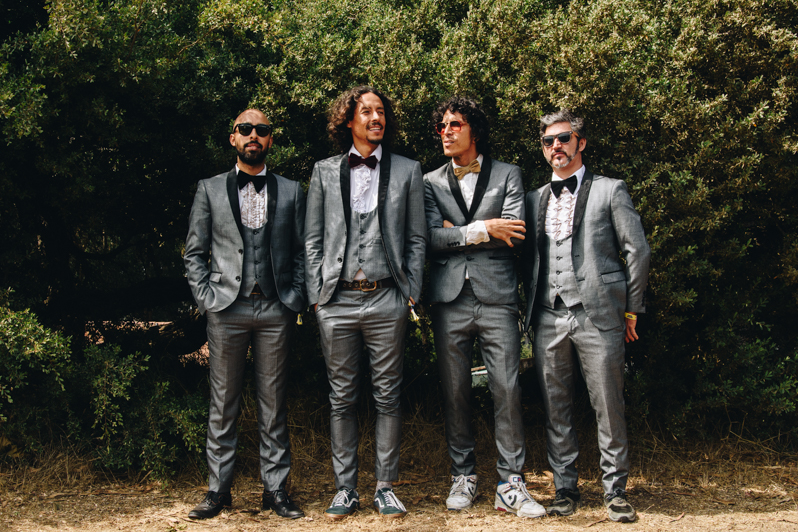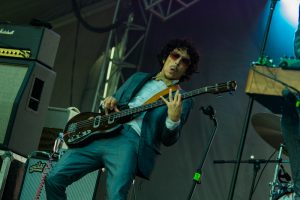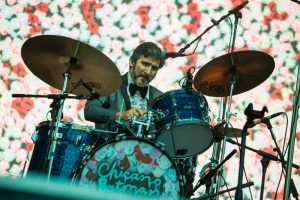Chicano Batman asks life’s big questions, prepares a return to the studio

Chicano Batman photographed at Outside Lands in San Francisco on Aug. 10, 2018. Photo: Shawn Robbins.
SAN FRANCISCO — In Los Angeles, just like in the Bay Area, finding an affordable place to call home has become more difficult in recent years. That hasn’t gotten past L.A.’s hardworking band of the people, Chicano Batman. In fact, it’s a major concern for vocalist Bardo Martinez, bassist Eduardo Arenas, guitarist Carlos Arevalo and drummer Gabriel Villa.
“We’re in our mid-30s and at some point we’d like to have a house,” Arenas said. “Unfortunately, we can’t necessarily afford … a house in the neighborhood I grew up in in L.A. because the prices are skyrocketing and it’s also getting gentrified.
“You think about ‘where’s my homestead?’ Those are really big [issues], especially to [care for] a family and to generations,” he said.
Chicano Batman has started working on its fourth album, a follow-up to critically lauded 2017 LP Freedom Is Free. On a big picture level, the band is still concerned about the direction of America. But the ways in which people’s lives are affected on a personal level is on the forefront of the band members’ minds. Where before the band wrote about police brutality against people of color, and seeking justice, they are looking at their place in their community, and in their families.
“I’m getting older and so are my parents,” Arenas said. “Who’s going to take care of them and what [my] role is as a son and family are creeping in. … We’re touring, we’re writing music. But we have families at home. Our fans have families at home, so everyone can reflect on that reality. That never gets turned off. Ever. … Those are beautiful things because everything that lives must die. Our parents will die. ‘What is [my] place in that process?’”
Chicano Batman is speaking toward the end of summer, at the Outside Lands Music Festival. The members have had a busy summer that included touring and a collaboration with Miguel, where both recorded each other’s songs.
Following a few more festival appearances and a short opening stint for Portugal. The Man, the band will hit the studio in earnest. Bardo Martinez has been writing and recording at his home studio since 2016, before the release of Freedom Is Free. So has Arenas, who produced the band’s first two records.
For the last record, Chicano Batman turned to musician Leon Michels, who has produced Sharon Jones and the Dap Kings, and recorded at his New York studio. For the first time, Martinez found himself getting addicted into music gear, adding guitar pedals, pre-amps, tape machines and more.
“It was like a big change for me, being able to basically manipulate a little bit more of the sound that we were creating,” he said.
The end result was the closest to soul and R&B that the Latin psych-pop and Tropicália band had come to so far. The band’s new songs are neither a departure nor a retread of the same style, Arévalo said. At their core, the songs are still soul, but there’s more of a rock edge, Arenas added, drawing a comparison to the soul of Alabama Shakes, which avoids traditional progressions common in the genre.
“We’re digging into different rabbit holes. I think we’re getting better at expressing our intention,” Arévalo said
Added Arenas: “It’s almost like pushing the boundaries of what soul can be. I think that’s kind of the route we’re trying to go for.
The two spoke of the soul genre’s wide interpretation, even between the 1970s and ‘80s, with the likes of Lionel Ritchie and Smokey Robinson.
Then Martinez butted in: “That’s a lie. We’re doing bluegrass,” he joked.
On the making of the video for Freedom is Free’s title track, in which the band acts as prisoners being beaten and tortured by having their faces dunked in a barrel, from the perspective of the barrel.
Bardo Martinez: I was the first one in line when they ducked my head and I was so scared. How can I put it? I don’t respond well to force. … The whole vibe was to make it look like we’re being tortured. So the guy’s actually pushing us and he’s a really buff dude and shit. He’s grabbing us and he tosses my head in and … I automatically want to throw my elbow back. Anyway, I put my head in. I was supposed to keep my head and then open my eyes and open my mouth. I couldn’t do it. I was the worst at it.
Carlos Arevalo: I used to swim in high school. The whole thing about it is you breathe; you stay calm. You can’t panic. You start sinking if you do that. … When you’re treading water you’ve got to constantly breathe in and out, and do it subconsciously, you can’t consciously [hyperventilate], or you start drowning.
To this point, Chicano Batman has bided its time between tours, demoing songs and bouncing ideas back and forth. Arévalo may start by tracking guitars before passing them to Martinez, who may add organs, synths and vocals.
“I’m really pushing to make sure that this record sounds different than the last record,” Arévalo said. “That’s always been the goal, I think. If you hear our records, it sounds like Chicano Batman, but they don’t sound like the same record replicated every time. And I think we’re just trying to grow. That growth is natural because we’ve been playing so much. We’re better musicians today than we were last year. And we’re just trying to keep with that trajectory.”
While Freedom Is Freewas written before Donald Trump was elected, its poignantly political songs resonated even more after he took office. “La Jura,” sung in Spanish, is a Black Lives Matter song. “La Flecha Al Sol” recasts a traditional Pueblo Indian children’s tale, the spoken-word “The Taker Story” recalls Gil Scott-Heron, and the title track is a declaration of the promises of the Constitution.
“If you’re a person of color growing up anywhere in the United States you know how it is to feel excluded,” Martinez said. “You feel that on a daily basis, from the [moment] you walk out your door.”
Martinez’s favorite comparison of the cross section of society is to a typical gas station, a melting pot of superficial “passing-by moments,” where people often act as themselves without putting on an act, and “exuding preconceptions … as opposed to just being chill and relaxed, and just taking things as they come.” The band has had its share of unfriendly interactions at gas stations.
“But I feel like our experience as Chicano Batman, playing at all these stages throughout the country, we felt the opposite of our regular interactions with people,” he said. “When we hit the stage … we’re giving our souls to people, we’re giving it all we’ve got, and people really appreciate that.”
Chicano Batman’s current concerns can be equally depressing at times as they were on the previous record. But the band members find happiness in the small day-to-day aspects of life to stay optimistic, not letting the subject matter drag them down. It could be a morning run, or the beach for a swim, or simply waking up each day, Martinez said.
“I feel happy with my family, I feel happy just being at home. I feel happy being in Los Angeles. I feel happy feeling the sun,” he said. “You could sniff some air [and] know it’s polluted. If you think about the pollution, it’s gonna affect you. It’s really about your state of mind. So you could really sift in the good stuff.”
To Arenas, writing about the bad is a coping mechanism. It doesn’t only let him talk about what he’s thinking, but connect with others who have the same concerns.
“There’s millions of other people that are going to connect on that same theme, and that’s all they needed to push forward in whatever it is they were doing—it’s time sensitive,” he said.
Follow editor Roman Gokhman at Twitter.com/RomiTheWriter.




